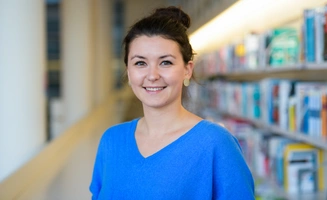Maëlig LE DÛ graduated as a nurse in 2014. She first practiced for several years in pediatrics, and in gynecological and obstetric emergencies, before specializing in public health and health promotion.
In October 2020, she joined Audencia to develop the student health service, a role that combines her two areas of expertise: nursing and health promotion. Working with the Student Life Department, she plays a central role in supporting students' well-being and personal development, offering both physical and mental health care, preventive actions and support on issues such as school integration and academic career planning.
What types of care do you offer Audencia students?
“Audencia has been addressing the issue of health support for our students for several years now. However, the isolation generated by the COVID period, as well as the social issues surrounding Sexual and Gender-Based Violence, have necessarily been taken into account by our institution. As a result, we have clearly strengthened our offer to create a cross-disciplinary support system in line with today's challenges. As a nurse at Audencia, I provide our students with comprehensive physical and mental support.
Within the School, we have set up a variety of programs to meet the individual needs of each student.
Students can book appointments with me via their Tomorrow platform for various consultations on the different campuses (Atlantic Campus, City Campus and Mediacampus): routine care (bandages, post-operative follow-up), preventive medicine advice (vaccinations, screenings) or any other somatic problem (headaches, sore throat, minor injuries). I am based in Nantes, but there is now also a nurse on the Paris Campus.
Although I'm not a psychologist, I'm trained in active listening and helping relationships, and I'm a first-aid trainer in mental health. Many students come to see me to discuss their concerns, whether they're related to stress, anxiety, sleep problems or general malaise. In such cases, I can accompany them over several sessions, or refer them to specialized health professionals such as psychologists or psychiatrists, if necessary.
My role is also to guide students towards the right resources, depending on their specific needs. We have partnerships with the Nantes Student Health Service (SSE), which has a multidisciplinary team (general practitioners, psychologists, dieticians, midwives, etc.).
This year, we have strengthened our offer with free psychological consultations on campus. A trilingual (French, English and Mandarin) psychologist is present every two weeks on the Atlantic campus, and is also available remotely for students who need it. In addition, students can access Pros-consulte, a free online listening service, where they can consult a psychologist at any time, 24/7.
I also work internally with Alysée MARTEL, Audencia's disability advisor, with whom students can make appointments for all their disability-related needs. She also liaises with the Nantes Student Health Service (SSE) and their approved doctors regarding schooling accommodations for students with disabilities.”
What are your preventive health activities?
“In this area, we organize events for all Audencia students. We address health issues identified by the ARS (regional health agency) as priorities for the student population.
These initiatives are led by student health relays, trained to organize prevention and awareness campaigns around health issues. This peer-to-peer prevention program makes it possible to tackle topics in a more fun and engaging way, with actions directly geared to students' needs and expectations. For example, they organize events on responsible drinking at student parties, nutrition, physical activity, mental health, consent and the prevention of sexually transmitted diseases.
One of the highlights of the year is BeeAware Month, usually held in November. This awareness-raising month brings together a wide range of events dealing with various mental and physical health issues. It's a time when we pool all our energies to convey prevention messages and encourage everyone to take care of their health.
But we also organize preventive actions throughout the year. At the start of the school year, we tend to focus on sleep and parties, so that everyone has the same knowledge from the outset. Then we'll talk about mental health and well-being. In January, we'll deal with nutrition and sport, and at the end of the year with sexuality. We also follow the calendar of national campaigns.”
Associations play an essential role in student life. Do you work with them on prevention?
“Yes, this is indeed part of our approach to preventive health care. I work closely with Sophie PELLOIS, who is in charge of associative life, on this subject. It's really necessary to raise awareness among our students, and it's a process that we formalize and improve every year.
We train all our associations on various important topics. This year, for example, we introduced a new system. All student lists have been trained in first aid, with at least 10 people per list. They also received training on how to organize safe parties, as well as on the prevention of sexist and sexual violence, among other topics.
These training courses cover crucial subjects. We know that these students are often behind many of the events that bring together a large part of the student community. That's why we do everything we can to train them as much as possible, so that they have the tools they need to react effectively.
The fact that the action is led by a student association also means we can reach a wider audience.”
